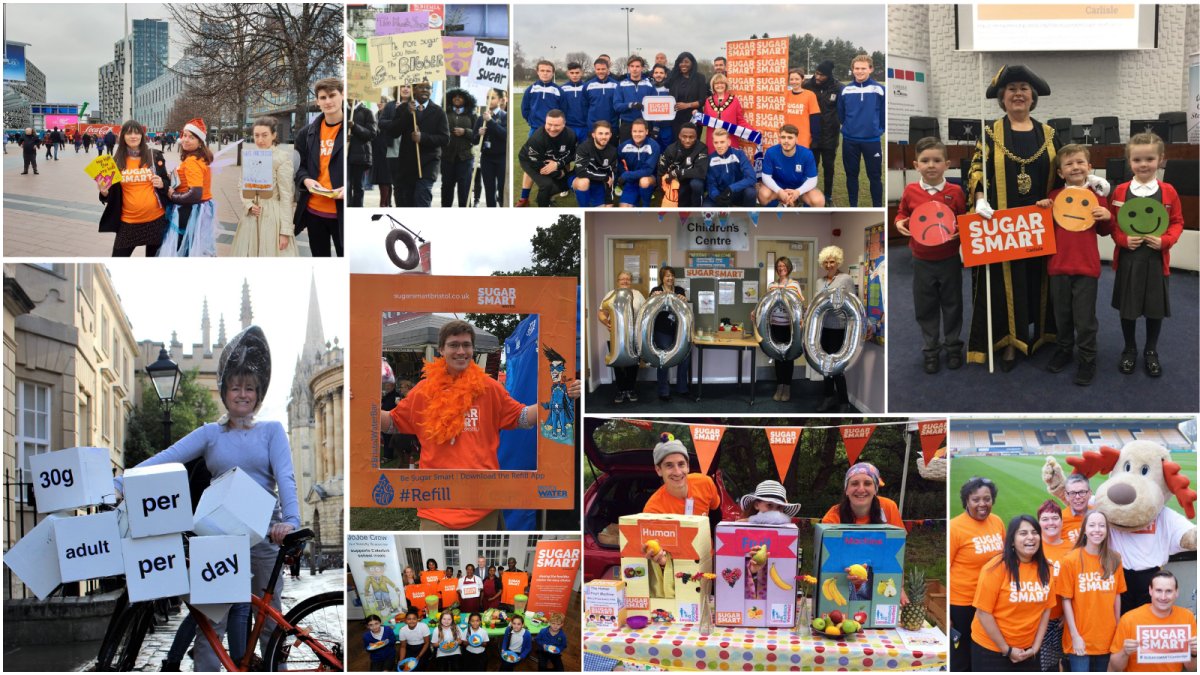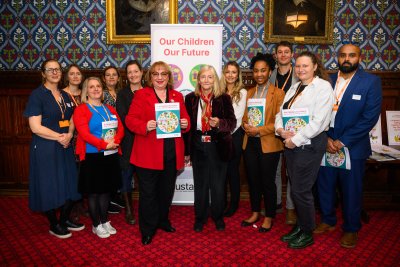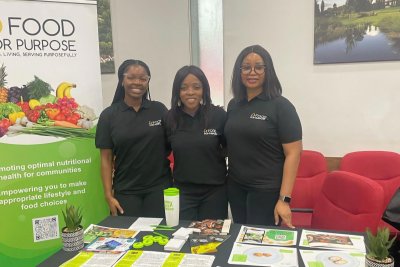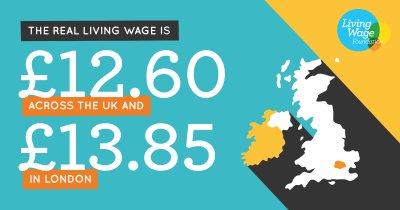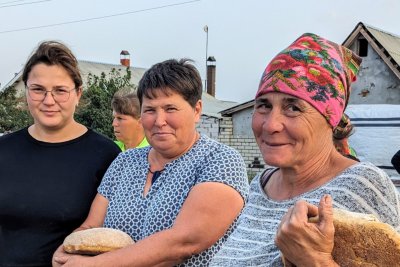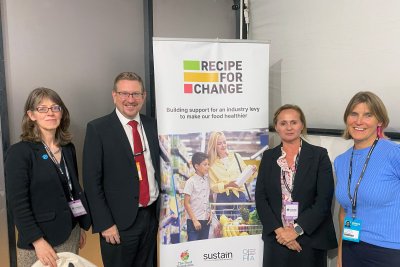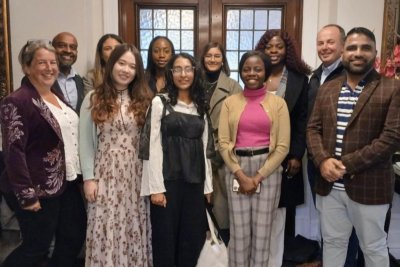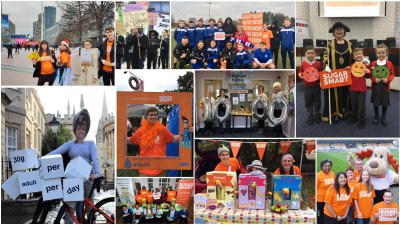 Collage of Sugar Smart Campaign activities and actions. Credit: Sustain
Collage of Sugar Smart Campaign activities and actions. Credit: Sustain
Every story must start at the beginning. You can say that the Sugar Smart campaign formally launched on the heels of Jamie Oliver’s 2015 Channel 4 documentary Sugar Rush (you can watch the short version for schools here). In it he spoke with families, educators and health professionals to comprehend our country’s growing sugar problem, and the impacts on families, communities and the NHS. The documentary also identified areas for national leadership on diet-related ill health, including a Soft Drinks Industry Levy and investment of revenue in school , community and NHS . But there was a clear sense that local areas could not wait for the glacial pace of politics.
Local areas had been getting on with public engagement around healthy eating and transforming food environments and provision for a long time. Sugar Smart turbocharged this momentum through the sharing of best practice, growing from three pilot campaigns in Brighton & Hove, the London Borough of Lewisham and Bristol in 2016 to a formidable network of over 80 local campaigns across the country by 2020.
As we bring this fantastic campaign to a close and increase capacity for other initiatives that will carry on the legacy, like Sustain’s Good Food Local programme, this is a great moment to reflect on the many legacies and spin offs Sugar Smart leaves behind.
Recipe for success
Sugar Smart was one of the feature campaigns of the Sustainable Food Places network. Like other campaigns in the programme, it followed a successful formula of supporting local network-led campaigns that brought together public, community, health and business sectors to take part in healthy eating promotion, improving food on offer, and changing policies. This landscape of actions in individual settings and communities was connected up on a national level, calling for government and business changes to ensure all the local work is not undone by activities beyond local control – like junk food advertising or the soft drinks industry levy.
Tooth Fairies take on Big Fizz
One emblematic agent of unhealthy food and drink advertising in the UK was not even a billboard, but a truck decked out in lights and coming to a town near you, often parked on public land. The Coca-Cola Holiday Truck tour concerned public health advocates, local authority teams and parents since it took to the road. Sugar Smart likewise set its sights on the Coke Truck Tour, supporting local campaign coordinators to write to hosts of truck tour stops asking them to stop inviting the multi-million pound promotional tour. The campaign also sent letters to the head of Coca-Cola GB asking for a cessation of unhealthy promptional stunts, cosigned by local and national organisations, as well as trusted public voices on food and health.
These efforts, coupled with ‘Tooth Fairy’ stunts led by food partnerships counter-promoting healthy eating advice near trucks, led to councils such as Liverpool voting to exclude the truck tour from public land in perpetuity. They also helped shift the public mood on the tour, recognised as a profit-driven publicity stunt contributing to a growing public health problem masquerading as a holiday staple. Following years of negative publicity, the truck tour is no longer stopping in publicly-owned land and has significantly reduced in size.
Giving sugar the red card
Speaking of culture change, it’s worth casting one’s mind back to a time when junk food and unhealthy drinks were a standard in leisure settings and sponsorships, a paradox when one considers their role as spaces to support healthier living. Thanks to Sugar Smart Campaign’s collaboration with leisure providers, particularly larger chains such Everyone Active and Better, things have changed. Sports & Leisure was chosen as a spotlight sector to focus on in the first year of the campaign, and it paid off. Many Sugar Smart campaigns (such as Cambridge) were launched at stadia, helping to cement good working relationships with local sports venues.
But while the Sugar Smart network’s open letters to the likes of Premier League calling for an end to junk food sponsorships in sport fell on largely deaf ears, leisure settings did listen and set a good example locally. Partnering up with Sugar Smart, Everyone Active pledged to cut three tonnes of sugar from food and drink on offer across its settings by switching to healthier and lower sugar options. Other national leisure providers followed suit with their own public announced changes.
We’ve ad enough
A number of local authorities running Sugar Smart campaigns or adopting Local Government Declarations on Sugar Reduction and Healthier Food zeroed in on healthier food advertising policies, ensuring public hoardings were not promoting products that put a burden on public health. Meanwhile Sustain's Children's Food Campaign worked with Food Active and local areas across the UK to put the Advertising Standards’ limited child obesity regulations to the test. These effots, combined with for the Mayor of London’s landmark decision to restrict unhealthy food and drink advertising on the Transport for London network in 2019, laid the groundwork for a number of local authorities bringing in their own comprehensive Healthier Food Advertising Policies, transforming council assets. Barnsley, Bristol, Greenwich, Haringey, Havering, Luton, Merton, Southwark, and Tower Hamlets have since adopted policies, with no less than 100 other local authorities currently working diligently toward the same goal.
The proof is in the school pudding
Like leisure, improving school meals is an effort that cannot be done in isolation or delayed until provider contracts are up for renewal. Sugar Smart took a similar approach, and in the campaign’s second year chose primary schools as a sector to focus campaign-wide energy around. Alongside platforming network examples of whole school approaches to school food, such as healthy packed lunch and event policies, the campaign identified the biggest catering providers such as Chartwells and Caterlink, and engaged with them directly around improving the school food offer.
It was not enough for individual councils to ask for fewer pudding days and a reduction of sugar across meals. As with leisure, we capitalised on an industry zeitgeist, with caterers already looking at making changes but keen for a public mandate and a receptive market. Caterlink was an early trailblazer, working with local areas running Sugar Smart campaigns to pilot menu changes and monitor feedback from pupils and school staff. They slashed sugar content by two thirds to 4.5g per day and rolled it out across their sites, resulting in a savings of 46 tonnes of sugar across their sites. Since then other caterers have run their own menu overhauls and sugar reduction.
Fountains fountains everywhere
Speaking of zeitgeists, there is no better example of the meaning of the term than that moment when the UK grappled with its single use plastic problem, and the time became right for a quickly spreading refill revolution. Well before plastic straw and cup bans, Sugar Smart and the Children’s Health Fund supported the set up of drinking fountains and water refill stations as solutions to both our sugar and single use plastic habits. It’s safe to say that this work warmed up local areas to jump on board with the Refill Campaign resulting in more venues and businesses signed up to offer free drinking water. Indeed Refill teams were some of the earliest partners collaborating with Sugar Smart campaigns, starting with Bristol – one of the first Sugar Smart areas and the birthplace of Refill.
On the back of this flurry, the Mayor of London announced an investment in 100 new drinking fountains on public spaces, and Sugar Smart teamed up with Refill to promote the 50 Fountains Challenge to ensure every local authority had at least as many across its communities. Southwark was one such area to take up the challenge. Before long, even Network Rail started to install drinking fountains of their own, benefitting the public for generations to come.
When even MPs went fizz-free
Lastly, it’s worth celebrating an example of when a campaign launches a movement that takes on a life of its own. Fizz Free February was first piloted by Sugar Smart Southwark as a monthly challenge. Sugar Smart took the campaign national, with a number of other localities going Fizz Free, including Birmingham, the UK’s most populous local authority. Even Labour’s then Shadow Deputy Leader Tom Watson, a public health advocate living with Type 2 diabetes, got on board and recruited a number of high profile MPs to join him in the cause. Since then, Tom’s left politics to focus on writing, and the Sugar Smart campaign has wound down, but every February, council websites, office canteens and home fridges get adorned with Fizz Free calendars ready to kick the fizzy habit and refresh healthy hydration habits.
Don’t dream it’s over
Amongst the national campaign’s many legacies in the form of policy change and physical infrastructure, it’s important to note that Sugar Smart lives on in local communities and councils across the UK who are still running local campaigns. The resources are free to use and encouraged to be adopted and adapted for local needs. When campaigns take on a life of their own without the need for central coordination, that's when they become a movement. That's the systems change sweet spot we're all looking for.
What’s more, Sustain’s new Good Food Local programme supporting local authorities to prioritise good food and commit to action on a breadth of food issues, is but one lever to continue recognising local leadership and action on sugar reduction and supporting healthy food environments. So get stuck in!
If you are working within your local authority helping to create a more healthy and sustainable food system so residents can access affordable, healthy and climate and nature friendly food, then sign up to hear more from Good Food Local.
Sustainable Food Places: The Sustainable Food Places Network helps people and places share challenges, explore practical solutions and develop best practice on key food issues, so if you are working to drive positive food change or are interested in developing a programme, please do get in touch.
Sustain
The Green House
244-254 Cambridge Heath Road
London E2 9DA
020 3559 6777
sustain@sustainweb.org
Sustain advocates food and agriculture policies and practices that enhance the health and welfare of people and animals, improve the working and living environment, promote equity and enrich society and culture.
© Sustain 2024
Registered charity (no. 1018643)
Data privacy & cookies
Icons by Icons8
